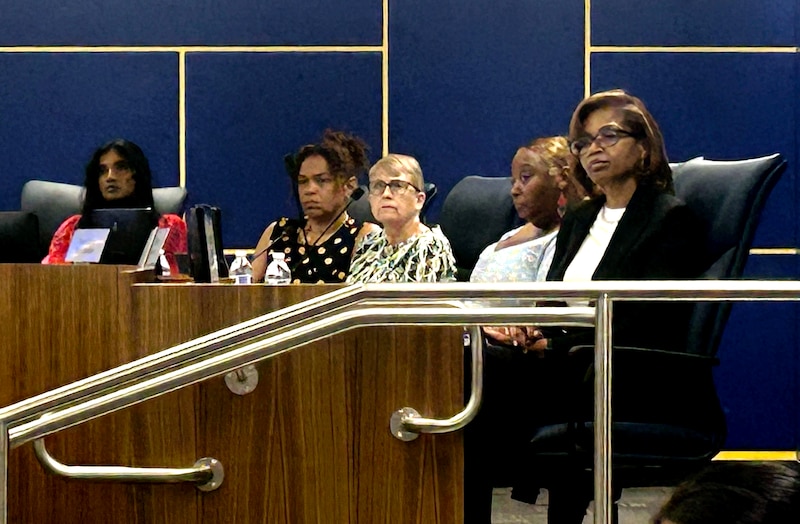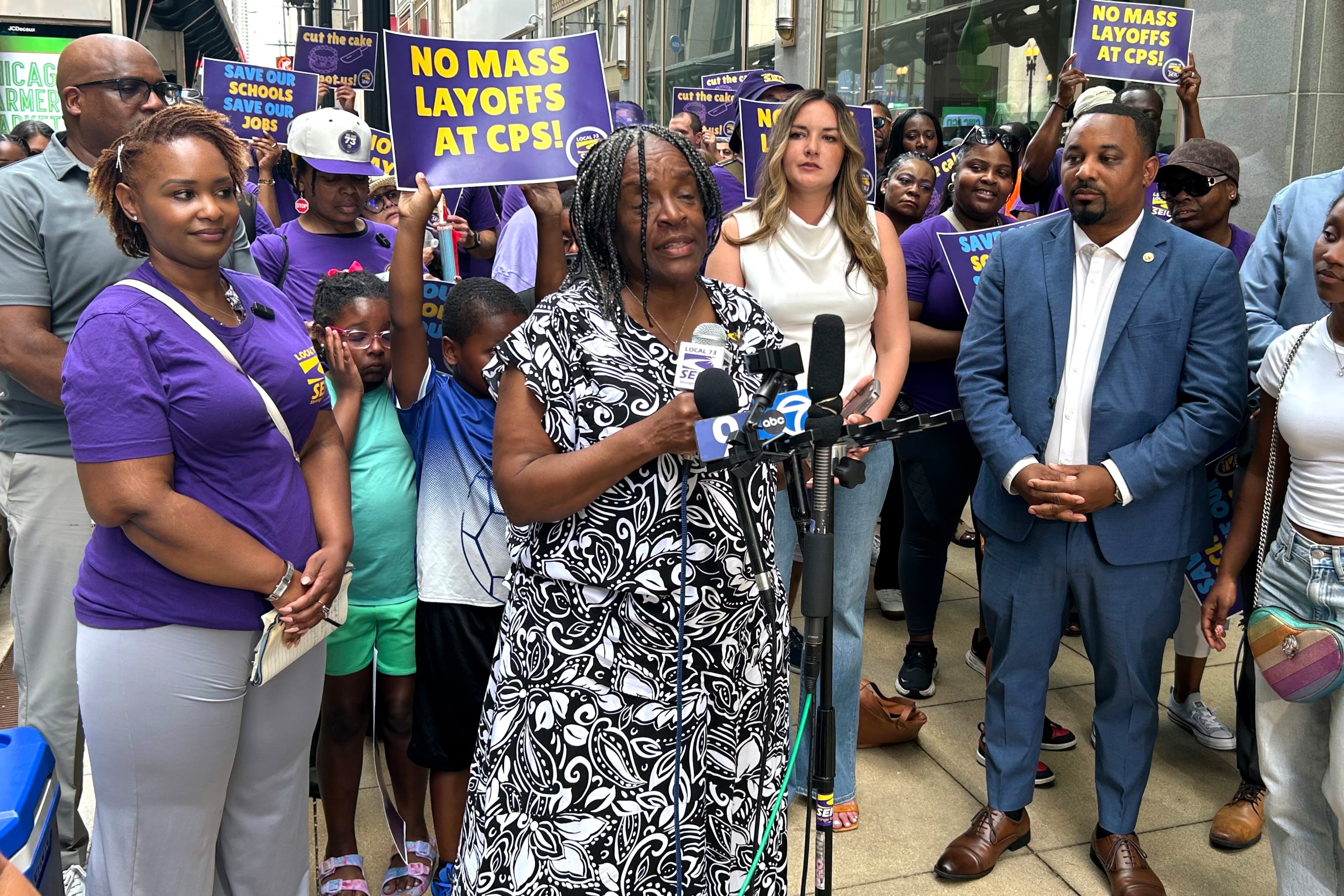Sign up for Chalkbeat Chicago’s free daily newsletter to keep up with the latest news on Chicago Public Schools.
Chicago Public Schools must close a $734 million gap in its budget, Macquline King, the district’s newly appointed interim CEO, told the school board Thursday.
That’s up from a $529 million deficit number district officials had previously cited. Officials said King’s larger number, which had been briefly presented as a worst-case scenario in previous months, includes a $175 million payment to a city pension fund that covers some district staff, among other public employees. It also factors in $30 million in costs for absorbing five Acero charter schools into the district to avert plans by the charter network to shutter them.
Former CEO Pedro Martinez argued the city is solely responsible for the pension payment, and his refusal to reimburse the city contributed to his firing by a former school board appointed by Mayor Brandon Johnson.
The pressing and thorny issue of balancing the district’s budget has immediately become a heavy burden for King, a former CPS principal who came to the role after serving in the mayor’s office, as she presided over her first board meeting. She addressed the situation during her remarks to the board, whose members chose her to step in for Martinez on an 11-to-8 vote earlier this month.
The district, which usually unveils its overall budget in June, had a $10 billion budget last school year. It’s not clear yet what the overall budget will be for the 2025-26 school year, but officials have said they will present a plan in late July or August, after King has had a chance to review options to address the deficit.
Currently, there are no easy ones.

The Martinez administration had called on the state and the mayor’s office to steer more money to the district. But state lawmakers passed a budget with largely flat education funding, and the city hasn’t yet signaled it would boost the amount of special property tax revenue it sends CPS.
Failing that, the district could be forced to make staffing cuts on the cusp of the new school year, which starts Aug. 18. Or else, it could revisit the idea of taking on a short-term, high-cost loan, a move that Martinez and some elected school board members have cautioned would saddle the district with more costly debt.
King didn’t give any clues about how she would proceed. But she promised to act with transparency, keep students at the center of any decisions, and take a collaborative approach.
“Transitions bring change,” she added. “But they also bring opportunity.”
Several board members of the partly elected school board — all of them appointed by Johnson — told King they have high hopes for her leadership. They encouraged her to avoid budget reductions that affect students.
“It’s not time to talk about cuts,” said board member Michilla Blaise. “It’s not time to talk about layoffs. It’s time to talk about revenue strategies.”
Before the board meeting, the Chicago Teachers Union and SEIU Local 73, which represents support staff in the district, held separate, back-to-back rallies calling on district officials to refrain from cutting positions and laying off workers in the coming year. The two unions, once close allies whose relationship became strained during the recent CTU contract talks, called for more revenue for the district.
Teachers union rally speakers demanded that the state steer more dollars to the district and public education more generally, noting today’s announcement that Gov. JB Pritzker is running for a third term.
Stacy Davis Gates, the union’s president, said the state can provide “the only sustainable solution” and added: “Let’s get some revenue on the table. Let’s tax the rich.”
At their own rally and during later public comments to the school board, SEIU Local 73 leaders called for more state funding as well. But they put the onus of addressing the district’s deficit much more squarely on Johnson, a former teachers union employee and strong ally.
SEIU Local 73 President Dian Palmer and others argued Johnson and the City Council could help solve the district’s financial woes in a big way by giving CPS more Tax Increment Financing dollars, from a program that reserves property tax money for development projects. That issue created tension between Martinez and Johnson.
Rallygoers slam possible cuts affecting students with disabilities
At the union’s rally, people also criticized a possible loss of positions related to dual language and students with disabilities. They said the district is poised to cut an unspecified number of dual language coordinator positions.
Theresa Nuestro, a parent of two students with autism at Jungman Elementary, said Special Education Classroom Assistants, or SECAs, have been essential to her children’s success in school. These staff members guide their learning, help them navigate the school environment, and manage a life-threatening peanut allergy and diabetes.
“Without adequate SECA support, our children don’t just struggle to learn,” she said. “They are at risk.”
Chicago Public Schools has said its overall spending on positions to support students with disabilities will increase this coming school year, even before factoring in employee raises. The district will add 120 new case managers and 100 new clinicians in keeping with its new teachers union contract, the district said in a recent letter to school leaders.
But as part of changes to how it allocates Special Education Classroom Assistants, who are represented by SEIU, the district will reduce the number of those positions assigned at the start of the year to existing cluster programs, which serve students with more severe disabilities. It’s not clear how the overall number of these assistants would be affected, as the district said it will add more SECAs to classrooms as schools assess student needs.
Jeannine Carrasquillo, a SECA in the district for 21 years, noted that the lower support staffing levels reflect state guidelines that she said are outdated and were created by those without relevant experience.
“Pushing these bare minimum numbers and layoffs of SECAs only pushes the idea that special education students don’t matter,” she said.
Meanwhile, several students wearing “Green schools are a budget solution” T-shirts at the CTU rally also called on the school board to back a pilot project to prioritize environmentally friendly projects in the district’s aging schools. They decried learning in schools that still grapple with issues such as mold, unsafe drinking water, and lack of air conditioning.
The board unanimously backed a “Healthy Green Schools” resolution, which sets a 2025-26 goal of pursuing at least a dozen clean energy projects, such as solar panels or geothermal heating. Board members said the initiative would improve the district’s facilities, save money in the long run, and expose students to environmental careers.
Mila Koumpilova is Chalkbeat Chicago’s senior reporter covering Chicago Public Schools. Contact Mila at mkoumpilova@chalkbeat.org.






